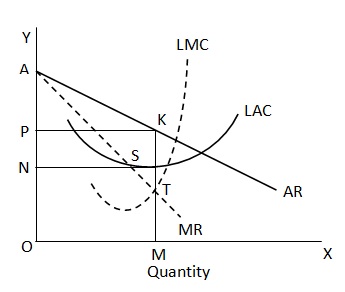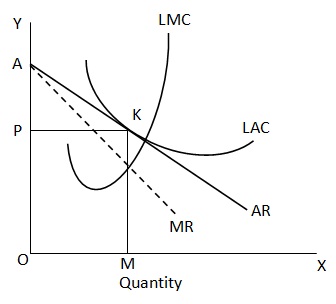In the long period, all costs become variable and hence there are no fixed costs which must be met anyway. A loss making monopolist can either adjust his plant size to his production requirements so that the average cost is less than or atleast equal to the average revenue, so as to give him supernormal or atleast normal profits. Or, he can leave the business if his total revenue still falls short of his total cost of production. Thus, the long – run conditions of equilibrium are:

The third condition, viz., AR ≥ LAC rules out the possibility of a monopolist making any losses in the long – run.
A monopolist who is earning abnormal profits in the short – run would continue to do so even in the long – run would continue to do so even in the long – run. This is because by the very nature of monopoly the entry of the new firms is blocked even in the long – run. And further since all monopolists can choose an appropriate plant size and reduce the average and the marginal costs of production. This would give him even greater profits in the long – run. The long – run equilibrium of a monopoly firm, where his long – run marginal cost curve LMC intersects with his MR curves.
That the monopolist continues to earn abnormal profits (PKSN) in the long – run. This is because
LMC = MR
But LAC < AR
Or AR > LAC.

But it is possible that even in the long – run, the revenue and cost conditions are such that at the equilibrium level of output, his total revenue is just equal to his total cost, the monopolist earns just normal profits because,
LMC = MR
And
LAC = AR
Thus, in the long – run, the monopolist either makes abnormal profits or only normal profits. There is no possibility of making losses in the long – run.